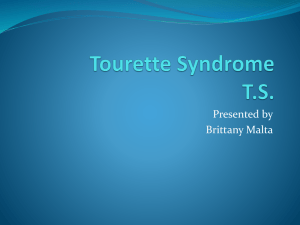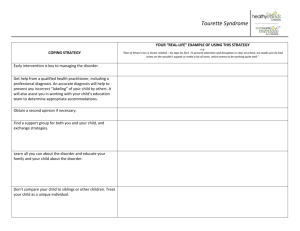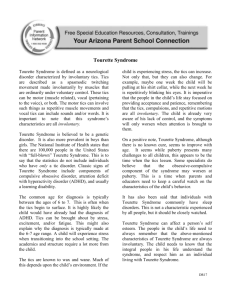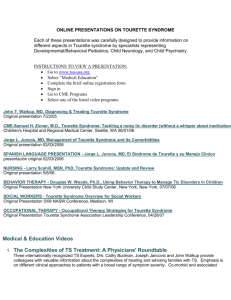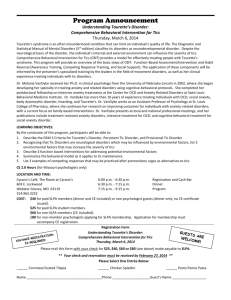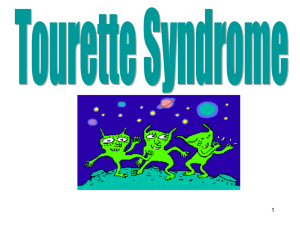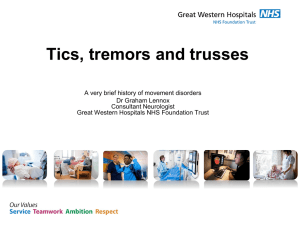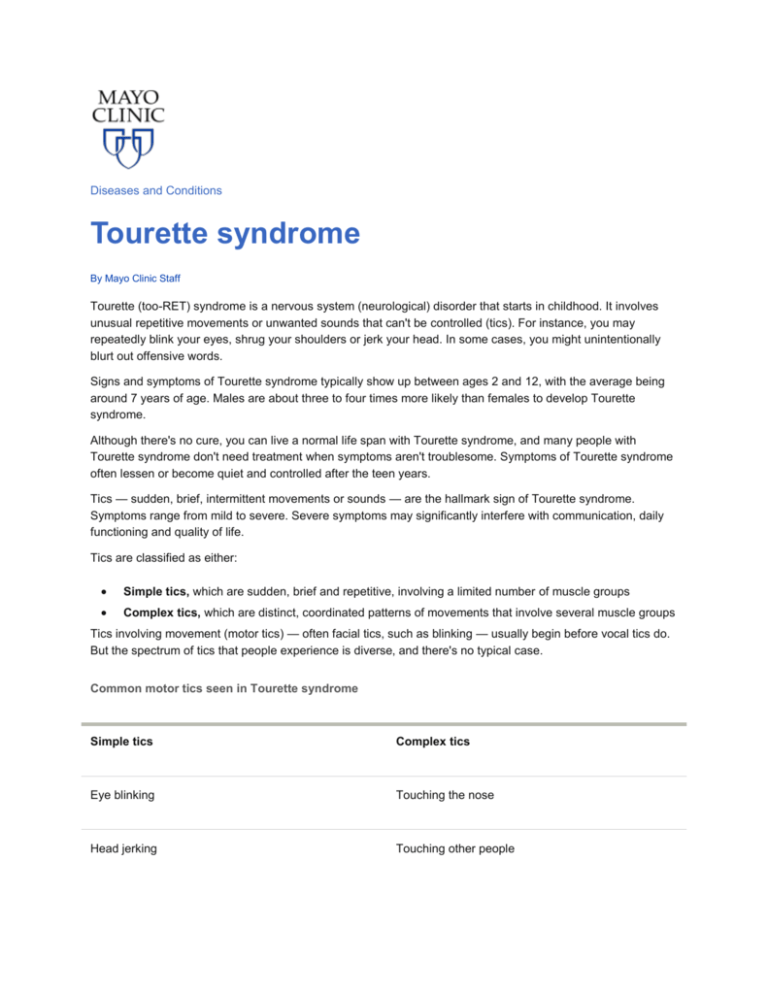
Diseases and Conditions
Tourette syndrome
By Mayo Clinic Staff
Tourette (too-RET) syndrome is a nervous system (neurological) disorder that starts in childhood. It involves
unusual repetitive movements or unwanted sounds that can't be controlled (tics). For instance, you may
repeatedly blink your eyes, shrug your shoulders or jerk your head. In some cases, you might unintentionally
blurt out offensive words.
Signs and symptoms of Tourette syndrome typically show up between ages 2 and 12, with the average being
around 7 years of age. Males are about three to four times more likely than females to develop Tourette
syndrome.
Although there's no cure, you can live a normal life span with Tourette syndrome, and many people with
Tourette syndrome don't need treatment when symptoms aren't troublesome. Symptoms of Tourette syndrome
often lessen or become quiet and controlled after the teen years.
Tics — sudden, brief, intermittent movements or sounds — are the hallmark sign of Tourette syndrome.
Symptoms range from mild to severe. Severe symptoms may significantly interfere with communication, daily
functioning and quality of life.
Tics are classified as either:
Simple tics, which are sudden, brief and repetitive, involving a limited number of muscle groups
Complex tics, which are distinct, coordinated patterns of movements that involve several muscle groups
Tics involving movement (motor tics) — often facial tics, such as blinking — usually begin before vocal tics do.
But the spectrum of tics that people experience is diverse, and there's no typical case.
Common motor tics seen in Tourette syndrome
Simple tics
Complex tics
Eye blinking
Touching the nose
Head jerking
Touching other people
Shoulder shrugging
Smelling objects
Eye darting
Obscene gesturing
Finger flexing
Flapping the arms
Sticking the tongue out
Hopping
Common vocal tics seen in Tourette syndrome
Simple tics
Complex tics
Hiccuping
Using different tones of voice
Yelling
Repeating one's own words or phrases
Throat clearing
Repeating others' words or phrases
Barking
Using vulgar, obscene or swear words
In addition, if you have Tourette syndrome, your tics may:
Vary in type, frequency and severity
Worsen if you're ill, stressed, anxious, tired or excited
Occur during sleep
Evolve into different tics over time
Worsen during teenage years and improve during the transition into adulthood
Before the onset of motor or vocal tics, you'll likely experience an urge called a premonitory urge. A
premonitory urge is an uncomfortable bodily sensation, such as an itch, a tingle or tension. Expression of the tic
brings relief.
With great effort, some people with Tourette syndrome can temporarily stop a tic or hold back tics until they find
a place where it's less disruptive to express them.
When to see a doctor
If you notice your child displaying involuntary movements or sounds, schedule an appointment with your
pediatrician. Not all tics indicate Tourette syndrome.
Many children develop tics lasting a few weeks or months that go away on their own. But whenever a child
shows unusual behavior, it's important to have a medical evaluation to identify the cause and rule out serious
health problems.
The exact cause of Tourette syndrome isn't known, and there's no known way to prevent it. Tourette is a
complex syndrome, likely caused by a combination of genetic and environmental factors. Theories about the
causes of Tourette include:
Genetics. Tourette syndrome may be an inherited disorder. The specific genes involved in Tourette
syndrome are still being defined, although one genetic mutation has been identified as a rare cause of
Tourette syndrome.
Brain abnormalities. Certain chemicals in the brain that transmit nerve impulses (neurotransmitters)
may play a role, including dopamine and serotonin.
Risk factors for Tourette syndrome include:
Family history. Having a family history of Tourette syndrome or other tic disorders may increase the risk
of developing Tourette syndrome.
Being male. Males are about three to four times more likely than females to develop Tourette syndrome.
People with Tourette syndrome have a normal life span and often lead healthy, active lives. However, having
Tourette syndrome may increase your risk of learning, behavioral and social challenges, which can harm your
self-image.
In addition, having Tourette syndrome means you're likely to have other related conditions, such as:
Attention-deficit/hyperactivity disorder (ADHD)
Obsessive-compulsive disorder (OCD)
Learning disabilities
Sleep disorders
Depression
Anxiety disorders
You'll likely start by seeing your family doctor or pediatrician. However, in some cases when you call to set up
an appointment, you may be referred immediately to a doctor who specializes in conditions of the nervous
system (neurologist).
Here's some information to help you prepare for your appointment.
What you can do
Write down any symptoms experienced, including any that may seem unrelated to the reason for
which you scheduled the appointment.
Write down key personal information, including any major stresses or recent life changes.
Make a list of all medications, vitamins or supplements currently taken.
Write down questions to ask your doctor.
Make a video recording, if you have a video camera, of a typical tic to show the doctor.
Prepare a list of questions for your doctor to help you make the most of your time together. List your questions
from most to least important. For Tourette syndrome, some basic questions to ask your doctor include:
Is this condition likely temporary, long term or lifelong?
What's the best course of action?
Are there any brochures or other printed material that I can take home with me? What websites do you
recommend?
What family and patient support groups are there in my area for people with this diagnosis?
Don't hesitate to ask other questions during your appointment anytime you don't understand something or need
more information.
What to expect from your doctor
Your doctor will likely ask you a number of questions, including:
When did the symptoms begin?
Have the symptoms been continuous or occasional?
How severe are the symptoms?
What, if anything, seems to improve the symptoms?
What, if anything, appears to worsen the symptoms?
There's no specific test that can diagnose Tourette syndrome. Instead, doctors must rely on the history of
symptoms to diagnose the disorder.
The Diagnostic and Statistical Manual of Mental Disorders (DSM) determines the criteria for a diagnosis of
Tourette syndrome. Published by the American Psychiatric Association, the DSM is used by mental health
professionals to diagnose certain conditions and by insurance companies to reimburse for treatment.
The criteria to diagnose Tourette syndrome include these:
Both motor tics and vocal tics must be present, although not necessarily at the same time.
Tics occur several times a day, nearly every day or intermittently, for more than a year. There must not
be a break in tics for more than a three-month period.
The onset of tics occurs before age 18.
Tics aren't caused by medications, other substances or another medical condition.
Diagnosis of Tourette syndrome may be delayed because families and even doctors are sometimes unfamiliar
with the symptoms, or the symptoms may mimic other problems. Eye blinking may be initially associated with
vision problems, for instance, while sniffling may be attributed to allergies.
Because other serious health conditions can cause motor or vocal tics, your doctor may suggest having tests to
rule out other causes. These tests include blood tests or neuroimaging studies, such as magnetic resonance
imaging (MRI).
There's no cure for Tourette syndrome. Treatment is intended to help control tics that interfere with everyday
activities and functioning. When tics aren't severe, treatment may be unnecessary.
Medications
No medication is helpful to everyone with Tourette syndrome, none completely eliminates symptoms, and they
all have side effects to be weighed against the benefits.
Possible medications to help control or minimize tics or to reduce symptoms of related conditions — such as
attention-deficit/hyperactivity disorder (ADHD) or obsessive-compulsive disorder (OCD) — include:
Drugs that block or deplete the neurotransmitter dopamine in the brain, such as fluphenazine,
haloperidol (Haldol) or pimozide (Orap). Used to control tics, these medications may have side effects
such as weight gain and a dulling of the mind.
Botulinum toxin type A (Botox) injections. For simple or vocal tics, an injection into the affected
muscle may help relieve the tic.
Stimulant medications, such as methylphenidate (Concerta, Ritalin, others) and those containing
dextroamphetamine (Adderall XR, Dexedrine, others). These are used to help increase attention and
concentration for people with ADHD.
Central adrenergic inhibitors, such as clonidine (Catapres) or guanfacine (Tenex). Typically prescribed
for high blood pressure, these drugs may help control behavioral symptoms, such as impulse control
problems and rage attacks. Side effects may include sleepiness.
Antidepressants, such as fluoxetine (Prozac, Sarafem, others). These may help control symptoms of
sadness, anxiety and OCD.
Therapies
Psychotherapy. In addition to helping you cope with Tourette syndrome, psychotherapy or talk therapy
can help with accompanying problems, such as ADHD, obsessions, depression or anxiety.
Behavior therapy. A form of behavior therapy called habit-reversal training may help to reduce tics. With
this therapy, you monitor tics and identify premonitory urges — those uncomfortable sensations that
occur before the tic. You learn to respond to those urges by voluntarily moving in a way that's
incompatible with the tic, which suppresses the tic.
Deep brain stimulation. For severe tics that don't respond to other treatment, deep brain stimulation
(DBS) may help. DBS consists of implanting a battery-operated medical device (neurostimulator) in the
brain to deliver electrical stimulation to targeted areas that control movement. More research is needed
to determine whether DBS benefits people with Tourette syndrome.
Your self-esteem may suffer as a result of Tourette syndrome. You may be embarrassed about your tics. You
may hesitate to engage in social activities, such as dating or going out in public. As a result, you're at increased
risk of depression and substance abuse.
To cope with Tourette syndrome:
Remember that tics usually get better as you get older. Tics usually reach their peak in the early teens to
midteens.
Reach out to others dealing with Tourette syndrome for information, coping tips and support.
Children with Tourette syndrome
School may pose special challenges for children with Tourette syndrome.
To help your child:
Become informed. Learn as much as you can about Tourette syndrome. Talk to your doctor about any
questions you have.
Nurture your child's self-esteem. Support your child's personal interests and friendships — both can
help build self-esteem.
Be your child's advocate. Help educate teachers, school bus drivers and others with whom your child
interacts regularly.
Find a support group. To help you cope, seek out a local Tourette syndrome support group. If there
aren't any, consider starting one.
References
1.
Disorders usually first diagnosed in infancy, childhood, or adolescence. In: Diagnostic and Statistical Manual of Mental
Disorders DSM-IV-TR. 4th ed. Arlington, Va.: American Psychiatric Association; 2000. http://www.psychiatryonline.com.
Accessed June 26, 2012.
2.
Jankovic J. Tourette syndrome. http://www.uptodate.com/index. Accessed June 25, 2012.
3.
Tourette syndrome fact sheet. National Institute of Neurological Disorders and Stroke.
http://www.ninds.nih.gov/disorders/tourette/detail_tourette.htm. Accessed June 25, 2012.
4.
Bloch MH, et al. Clinical course of Tourette syndrome. Journal of Psychosomatic Research. 2009;67:497.
5.
5. Kurlan R. Tourette's syndrome. New England Journal of Medicine. 2010;363:2332.
6.
McNaught KS, et al. Advances in understanding and treatment of Tourette syndrome. Nature Reviews Neurology.
2011;7:667.
7.
Hoecker JL (expert opinion). Mayo Clinic, Rochester, Minn. July 6, 2012.
8.
O'Rourke JA, et al. The genetics of Tourette syndrome: A review. Journal of Psychosomatic Research. 2009;67:533.
Aug. 10, 2012
Original article: http://www.mayoclinic.org/diseases-conditions/tourette-syndrome/basics/definition/CON-20043570
Mayo Clinic Footer
Legal Conditions and Terms
Any use of this site constitutes your agreement to the Terms and Conditions and Privacy Policy linked below.
Terms and Conditions
Privacy Policy
Notice of Privacy Practices
Advertising
Mayo Clinic is a not-for-profit organization and proceeds from Web advertising help support our mission. Mayo
Clinic does not endorse any of the third party products and services advertised.
Advertising and sponsorship policy
Advertising and sponsorship opportunities
Reprint Permissions
A single copy of these materials may be reprinted for noncommercial personal use only. "Mayo," "Mayo Clinic,"
"MayoClinic.com," "EmbodyHealth," "Enhance your life," and the triple-shield Mayo Clinic logo are trademarks
of Mayo Foundation for Medical Education and Research.
© 1998-2014 Mayo Foundation for Medical Education and Research. All rights reserved.

